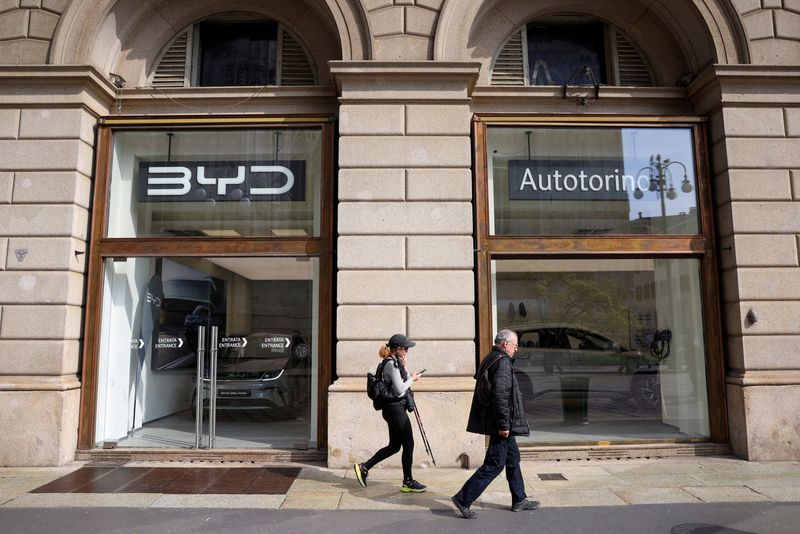By Philip Blenkinsop
BRUSSELS (Reuters) -China and the European Commission have agreed to start talks on the planned imposition of tariffs on Chinese-made electric vehicles (EVs) being imported into the European Union, opening the door to potential de-escalation.
The European Commission is planning to impose provisional duties on EVs produced in China ranging from 17.4% to 38.1%, on top of its standard 10% tariff for car imports.
The duties are due to apply by July 4.
WHAT ARE PROVISIONAL MEASURES?
Provisional duties can be imposed within nine months of the start of an EU anti-subsidy investigation if the Commission concludes it needs to prevent injury to EU industry.
They can be applied for a maximum of four months, by which point the Commission will decide whether to apply final duties, known as definitive duties. In the EV case, the deadline for this is Nov. 3.
Provisional duties are only collected if definitive duties are imposed at the end of the investigation. If definitive duties are lower or not applied, then provisional duties are adjusted down accordingly. Until then, customs authorities normally just require a bank guarantee from importers.
The duties can also be applied retroactively for as much as 90 days, so in the EV case from early April, with a decision on this taken at the end of the investigation.
WHAT HAPPENS NEXT?
On June 22, Germany's Economy Minister Robert Habeck said he had been informed by EU commissioner Valdis Dombrovskis that there would be concrete negotiations on the tariffs with China.
"What I suggested to my Chinese partners today is that the doors are open for discussions and I hope that this message was heard," Habeck said in Shanghai after meetings with Chinese officials in Beijing.
By July 4, the Commission is due to publish in the EU official journal a lengthy document detailing the ongoing investigation and its findings. The provisional duties will then apply the following day.
Interested parties such as China and EV producers have until July 18 to comment on the findings. They can also request a hearing.
The Commission has already visited more than 100 sites of automakers in China and Europe and done the bulk of its investigation.
Its final report generally reads as a confirmation of its provisional findings, with possible adjustments following comments received.
Definitive duties are often a little lower than the provisional rates, reflecting an acceptance of some of these arguments.
One new element will be Tesla (NASDAQ:TSLA)'s request that the Commission calculate a separate duty rate for it.
The largest EV exporter from China to Europe will want to have a lower rate than the 21% for companies that have cooperated with the investigation, a group it is currently in.
As an alternative to duties, exporters can commit to sell their products at or above a minimum price. Chinese exporters agreed such an undertaking in the case of solar panels a decade ago. However, cars are not commodities, so it is hard to see how a minimum price could be applied.
WHO DECIDES?
At the provisional stage, the Commission has full power to impose duties, although it does consult EU members and is supposed to take their positions into account. They are to submit their positions by July 15.
At the end of the investigation, the Commission can then propose definitive duties, normally applying for five years.
It can be blocked if a qualified majority of the European Union's 27 members oppose measures. A qualified majority means 15 EU members representing 65% of the EU population. In most cases, there is no blocking majority.
WHAT HAPPENS AFTER THE INVESTIGATION?
Any company not in the sample group of BYD, Geely and SAIC that wishes to have its own individual duty can ask for an "accelerated review" just after the imposition of definitive measures. Such a review should last a maximum of nine months.
The Commission can also carry out an "interim review" after a year has elapsed if the measures are no longer necessary or if they are not sufficient to counteract subsidies.

The Commission itself often looks into whether producers are evading duties via exports of parts for assembly elsewhere. For the EU, such circumvention exists if 60% or more of the value of parts are imported from the country subject to duties and if the value added in the assembly is no more than 25%.
Companies can challenge the measures at the European Court of Justice. China can take the European Union to the World Trade Organization. Both legal paths can take well over a year.